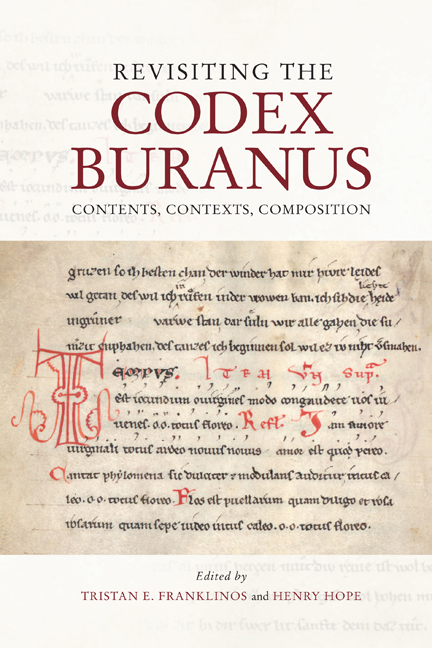Book contents
- Frontmatter
- Contents
- List of Illustrations
- Acknowledgements
- Abbreviations
- Dedication
- Introduction: The Codex Buranus – A Unique Challenge
- Chapter 1 A Modern Reception History of the Codex Buranus in Image and Sound
- Chapter 2 Parody in the Codex Buranus
- Chapter 3 Satire in the Codex Buranus
- Chapter 4 ‘Artes Amatorie Iam Non Instruuntur’: Learned and Erotic Discourse in the Carmina Burana
- Chapter 5 Classical Learning and Audience in the Carmina Amatoria: A Case-Study on CB 92
- Chapter 6 Rape, the Pastourelle, and the Female Voice in CB 185
- Chapter 7 Rethinking the Carmina Burana III: The Poetry of Peasants
- Chapter 8 Predestination and God’s Grace: The Salvific Architecture of the Religious Songs in the Codex Buranus
- Chapter 9 Revisiting the Plays of the Codex Buranus
- Chapter 10 Revisiting the Music of the Codex Buranus
- Chapter 11 Locating the Codex Buranus: Notational Contexts
- Chapter 12 Plurilingualism in the Codex Buranus: An Intercultural Reconsideration
- Chapter 13 Compilation, Contrafacture, Composition: Revisiting the German Texts of the Codex Buranus
- Afterword: multiformis armonia, scolaris symphonia
- List of Manuscripts
- Bibliography
- Index
- General Index
- Studies in Medieval and Renaissance Music
Afterword: multiformis armonia, scolaris symphonia
Published online by Cambridge University Press: 16 September 2020
- Frontmatter
- Contents
- List of Illustrations
- Acknowledgements
- Abbreviations
- Dedication
- Introduction: The Codex Buranus – A Unique Challenge
- Chapter 1 A Modern Reception History of the Codex Buranus in Image and Sound
- Chapter 2 Parody in the Codex Buranus
- Chapter 3 Satire in the Codex Buranus
- Chapter 4 ‘Artes Amatorie Iam Non Instruuntur’: Learned and Erotic Discourse in the Carmina Burana
- Chapter 5 Classical Learning and Audience in the Carmina Amatoria: A Case-Study on CB 92
- Chapter 6 Rape, the Pastourelle, and the Female Voice in CB 185
- Chapter 7 Rethinking the Carmina Burana III: The Poetry of Peasants
- Chapter 8 Predestination and God’s Grace: The Salvific Architecture of the Religious Songs in the Codex Buranus
- Chapter 9 Revisiting the Plays of the Codex Buranus
- Chapter 10 Revisiting the Music of the Codex Buranus
- Chapter 11 Locating the Codex Buranus: Notational Contexts
- Chapter 12 Plurilingualism in the Codex Buranus: An Intercultural Reconsideration
- Chapter 13 Compilation, Contrafacture, Composition: Revisiting the German Texts of the Codex Buranus
- Afterword: multiformis armonia, scolaris symphonia
- List of Manuscripts
- Bibliography
- Index
- General Index
- Studies in Medieval and Renaissance Music
Summary
Hec memor corde serua,
quod te mea Minerua,
nunc prudens nunc proterua, multiformi hactenus declarat armonia: prosa, uersu, satira psallens et rythmachia te per orbem intonat scolaris symphonia.
Keep this thought safe in your heart: that it is of you whom my Muse – now cautious, now bold – continues to sing with varied harmonies: she sings in prose, in verse, in satire, and in rhythmic poesy, she – a learned symphony – makes your name to resound throughout the world.
(CB 65, §10a)Any manuscript – assuming that it is not the precise copy of a liturgical or didactic reference text with a clearly defined function – is unique: it constitutes a singular compilation and presentation of text in its widest sense, adapted to the distinct knowledge, needs, and purposes of its context, patrons, and users. The Codex Buranus in many respects appears to be even more unique than other manuscripts of medieval lyric. One of a kind, it is the most comprehensive, minutely organised collection of a carefully selected, largely non-liturgical, and decidedly secular repertoire of medieval Latin poetry. The scope of the manuscript and the frequency with which seemingly contrary elements are juxtaposed in every aspect of the Codex Buranus are no less exceptional. To name only a handful of the most frequently adduced binaries that are inherently undermined by the multifarious nature of the Codex Buranus: it is both sacred and secular, and represents clerical and lay cultures; it contains poetry in Latin and various vernaculars that is weighty and trivial, moralist and frivolous, serious and humorous; it gathers together highly learned poetry and that which is incomprehensible; it exemplifies the reception of the seemingly ‘central’ Francophone literary and musical traditions in ‘peripheral’ German sources; and parts of the manuscript seem to be ordered subtly, whilst the arrangement of others appears to be a work in progress. A willingness to acknowledge this surprising plurality and the outward-looking openness of the literary and musical voices that abound in the manuscript underlies many of the new insights offered by the present volume: the contributors move beyond a number of apparent scholarly impasses and thus broaden and deepen of our understanding of the lives of clergy and the attitudes displayed by them in the High Middle Ages.
- Type
- Chapter
- Information
- Revisiting the Codex BuranusContents, Contexts, Compositions, pp. 393 - 402Publisher: Boydell & BrewerPrint publication year: 2020

